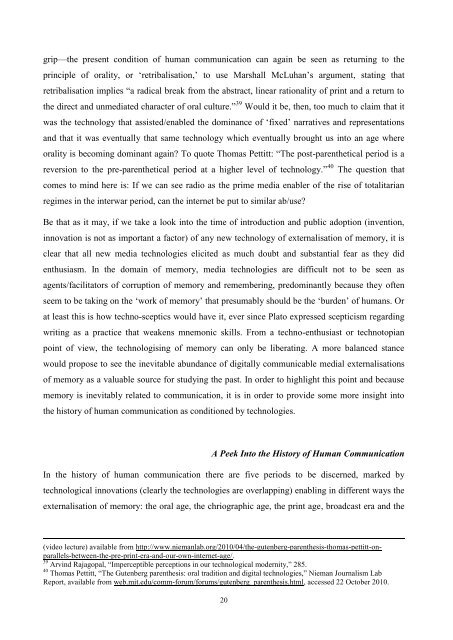UNIVERSITY OF NOVA GORICA GRADUATE SCHOOL ...
UNIVERSITY OF NOVA GORICA GRADUATE SCHOOL ...
UNIVERSITY OF NOVA GORICA GRADUATE SCHOOL ...
You also want an ePaper? Increase the reach of your titles
YUMPU automatically turns print PDFs into web optimized ePapers that Google loves.
grip—the present condition of human communication can again be seen as returning to the<br />
principle of orality, or ‗retribalisation,‘ to use Marshall McLuhan‘s argument, stating that<br />
retribalisation implies ―a radical break from the abstract, linear rationality of print and a return to<br />
the direct and unmediated character of oral culture.‖ 39 Would it be, then, too much to claim that it<br />
was the technology that assisted/enabled the dominance of ‗fixed‘ narratives and representations<br />
and that it was eventually that same technology which eventually brought us into an age where<br />
orality is becoming dominant again? To quote Thomas Pettitt: ―The post-parenthetical period is a<br />
reversion to the pre-parenthetical period at a higher level of technology.‖ 40 The question that<br />
comes to mind here is: If we can see radio as the prime media enabler of the rise of totalitarian<br />
regimes in the interwar period, can the internet be put to similar ab/use?<br />
Be that as it may, if we take a look into the time of introduction and public adoption (invention,<br />
innovation is not as important a factor) of any new technology of externalisation of memory, it is<br />
clear that all new media technologies elicited as much doubt and substantial fear as they did<br />
enthusiasm. In the domain of memory, media technologies are difficult not to be seen as<br />
agents/facilitators of corruption of memory and remembering, predominantly because they often<br />
seem to be taking on the ‗work of memory‘ that presumably should be the ‗burden‘ of humans. Or<br />
at least this is how techno-sceptics would have it, ever since Plato expressed scepticism regarding<br />
writing as a practice that weakens mnemonic skills. From a techno-enthusiast or technotopian<br />
point of view, the technologising of memory can only be liberating. A more balanced stance<br />
would propose to see the inevitable abundance of digitally communicable medial externalisations<br />
of memory as a valuable source for studying the past. In order to highlight this point and because<br />
memory is inevitably related to communication, it is in order to provide some more insight into<br />
the history of human communication as conditioned by technologies.<br />
A Peek Into the History of Human Communication<br />
In the history of human communication there are five periods to be discerned, marked by<br />
technological innovations (clearly the technologies are overlapping) enabling in different ways the<br />
externalisation of memory: the oral age, the chriographic age, the print age, broadcast era and the<br />
(video lecture) available from http://www.niemanlab.org/2010/04/the-gutenberg-parenthesis-thomas-pettitt-onparallels-between-the-pre-print-era-and-our-own-internet-age/.<br />
39 Arvind Rajagopal, ―Imperceptible perceptions in our technological modernity,‖ 285.<br />
40 Thomas Pettitt, ―The Gutenberg parenthesis: oral tradition and digital technologies,‖ Nieman Journalism Lab<br />
Report, available from web.mit.edu/comm-forum/forums/gutenberg_parenthesis.html, accessed 22 October 2010.<br />
20

















